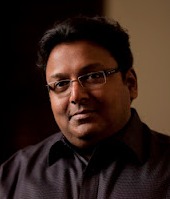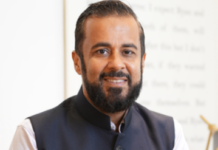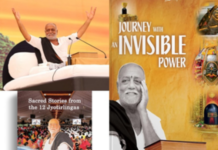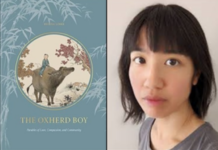By Sahana Ghosh
Kolkata– Author Ashwin Sanghi, who self-published his first book a decade ago, says things have become “far better” in the publishing world since then but observes a lot needs to be done to motivate new authors and encourage fresh storytelling formats.
“Things have become far better, but we still need a lot more to happen… publishers need to encourage younger and newer authors to come in and encourage newer formats of storytelling,” Sanghi, a best-selling author in the fiction-thriller genre, told IANS in an interview.

Expanding on this, Sanghi recounted his journey of rejection by 47 literary agents and publishers before he could push out his maiden book “The Rozabal Line” for readers.
While scouting for a publisher in 2005, the Mumbai-based author discovered there were only a couple of literary agents – and self-publishing was yet to catch on.
“When I started out in 2005, looking for a publisher, self-publishing was very limited. Self-publishing per se as an option didn’t exist. It’s only in 2007 when I had become absolutely fed up and by then the initial starting point of self-publishing had kicked off, I got my first book out as a self-publisher,” he said.
“Today you have 20 to 30 self-publishing platforms,” he remarked.
The businessman-turned-writer self-published “The Rozabal Line” under the pseudonym Shawn Haigins, an anagram of his name.
Referring to the ‘cell phone novel’ style that originated in Japan, Sanghi made his pitch for incorporating latest trends.
“The publishing world currently still works through traditional ways and, as a result, a large number of manuscripts still do not get read. Through self-publishing, you could actually create a platform where the best of works automatically start moving upward,” he explained here during the launch of “The Sialkot Saga”.
“The Sialkot Saga”, Sanghi’s fourth, is a tale of two men hailing from different backgrounds whose pasts are connected by an ancient secret. Beginning with post-partition events, the book swings from Pataliputra during the reign of Asoka – where the secret lies – and then enters the lives of the protagonists.
But after three best-selling novels (“The Rozabal Line”, “Chanakya’s Chant” and “The Krishna Key”), as well as his continuing collaboration with American author James Patterson on a thriller series, doesn’t Sanghi long to transition to the world of films through movie adaptations of his books, like some of his contemporaries?
“Currently, ‘The Krishna Key’ is with a producer and if all goes well it might become a movie in a couple of years from now. But ‘Chanakya’s Chant’, I don’t think it lends itself to a movie… at one point of time it was with a producer but telling an entire story in a matter of two hours is a very difficult thing to do. It’s more suited for a digital series or a TV series.
“I am not bothered, either way, because at the end of the day I want to tell a story and after I am done with it, then I move on to my next one. Then, along the way, if someone comes up and says this is great for a movie, or a series or illustrated comic book, then sure, be my guest. But as far as I am concerned I have my next story to tell.”
For the time being, Sanghi is working on the next book in his collaboration with Patterson (“Private India”) and also with young authors for the non-fiction “13 Steps” series.
“He understands the process of collaboration because he does it so often and, most importantly, he understands the craft of writing thrillers very beautifully,” Sanghi commented.
Hailed as the Indian Dan Brown for “The Rozabal Line” and “The Krishna Key”, Sanghi professes to using gadgets (such as iPhone for jotting ideas and reading on Kindle app (on iPad) “all the time” for his reading and writing. Banking on the market penetration, Sanghi estimates e-book sales of his books should double up in a couple of years.
“Currently Kindle is not at a level which compares with paperbacks. Around five to seven percent sales is e-book sales. So the numbers are still small but the growth rate in those numbers is very high. So I would say the figure of seven percent now would probably hit a figure of 15 percent in two years.”
Despite all the technological advancements, Sanghi still advises wannabe writers to carry on their day job and test the waters.
“I would suggest carry on your 9-to-5 job and write in the time you have over the weekends or at night, to feel the waters. You have to remain at it for several years before your royalties or your other income will ever be able to support you.”
But, most importantly, he stresses on persistence.
“In any creative profession, you have to keep at it, be thick-skinned, in spite of the bunch of things people tell you. That persistence factor seems to be missing in a lot of youngsters these days and if you want to be a writer you have to persistent,” Sanghi quipped. (IANS)














